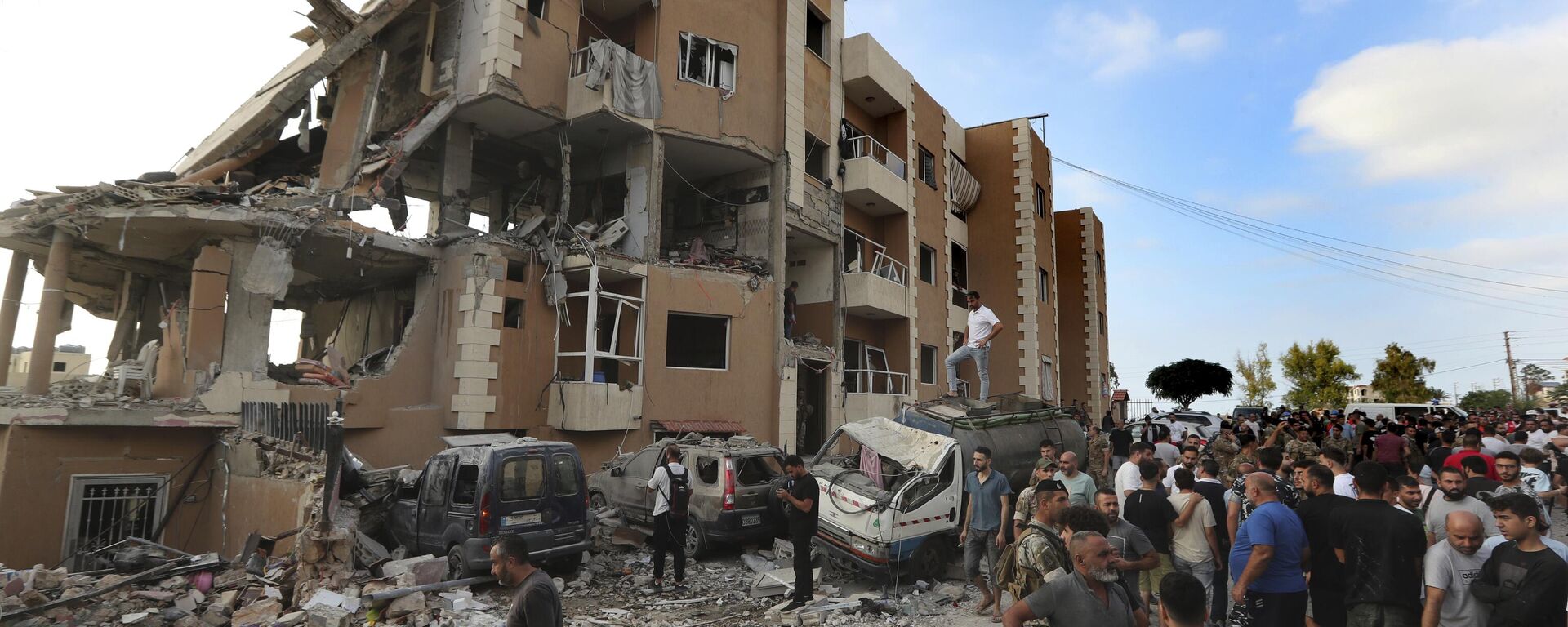https://sputnikglobe.com/20241126/is-ceasefire-between-israel-and-hezbollah-actually-possible-1121012373.html
Is Ceasefire Between Israel and Hezbollah Actually Possible?
Is Ceasefire Between Israel and Hezbollah Actually Possible?
Sputnik International
More than a year since the beginning of the latest escalation between Israel and Hezbollah, and nearly two months since the launch of Tel Aviv's invasion of Lebanon, several media outlets report today that a ceasefire may soon be achieved.
2024-11-26T18:33+0000
2024-11-26T18:33+0000
2024-11-26T18:33+0000
analysis
middle east
israel
lebanon
hezbollah
benjamin netanyahu
simon tsipis
ceasefire
negotiations
https://cdn1.img.sputnikglobe.com/img/07e8/0a/15/1120616605_0:160:3072:1888_1920x0_80_0_0_1889a33a74d0fc132d51d3ac3e4ec5fa.jpg
The ceasefire plan, actively pushed by the US and brokered by France, has ostensibly been approved by the Lebanese side and may soon be approved by Tel Aviv, if these reports are to be believed.While some foreign powers like the US seek to broker a ceasefire and end this conflict, Israeli PM Benjamin Netanyahu and the coalition of “neo-Zionist, ultra-right and religious” Israeli parties he represents are not interested in such a deal, warns Tel Aviv-based international relations expert Dr. Simon Tsipis.According to him, Israel would only agree to a ceasefire if southern Lebanon were to be ceded to Israel.Though Lebanon already offered a number of concessions to Israel – such as, for example, offering to crack down on Hezbollah and even establishing a buffer zone in southern Lebanese regions – Tsipis suggests that Netanyahu will probably stall the peace process to the last in an effort to gain as many “dividends” as possible from both Lebanon and the US.Regarding the Biden administration’s efforts to negotiate a ceasefire as soon as possible, Dr. Tsipis argues that the US Democrats are pursuing two goals, one of them being acquiring a reputation of peacemakers for the next presidential election.The second, much more important goal, he claims, is to make the situation in the Middle East as complicated as possible so that the Trump administration would spend all of its four years in power to “untangle” the ensuing mess.At the same time, Dr. Tsipis postulates, the Arab Sunni states who looked to normalize their relations with Israel via the Abraham Accords during Trump’s first presidency may not like the idea of Israel normalizing relations with Lebanon, because it may potentially lead to a normalization between Israel and Iran.As for Netanyahu, Tsipis says that the Israeli prime minister is unwilling to agree to a ceasefire because it would make him appear to be a traitor in the eyes of the Israeli right-wing “radicals” who regard Lebanon as an enemy, and because it would make him look like a weak politician who caved in to the US Democrats’ pressure.How Foreign Powers Meddle in Israeli-Lebanese Peace ProcessFrance and Britain have become deeply involved in the current Israeli-Lebanese ceasefire negotiations, says Tel Aviv-based international relations expert Dr. Simon Tsipis.He points out, however, that France adopted a rather strange approach to this matter. While trying to offer itself as an intermediary for the Israeli-Lebanese negotiations, Paris simultaneously bars Israeli weapon manufacturers from participating in a major arms expo in France – a move that is unlikely to endear France to Israel.Meanwhile, Britain seeks to operate behind the scenes, trying to use the US Democrats and the Biden administration to pressure Israel, Dr. Tsipis notes.When London’s efforts fail, however, it imposes an arms embargo against Israel to punish Tel Aviv for pursuing a policy that does not take the interests of US Democrats and “Anglo-Saxons” into account.Such annexation, he notes, would further exacerbate the refugee crisis and create new problems for the UK with its sizeable Muslim society.Therefore, Tsipis says, all of the foreign parties he mentioned – France, Britain and the US – would like to have Israeli Prime Minister Benjamin Netanyahu ousted as soon as possible whereas the latter knows it and actively resists their efforts to topple him.
https://sputnikglobe.com/20241119/lebanon-hezbollah-generally-agree-to-us-proposal-for-ceasefire-with-israel---reports-1120924312.html
https://sputnikglobe.com/20241111/lebanons-economic-losses-from-war-with-israel-exceed-5bln---prime-minister-1120854746.html
israel
lebanon
Sputnik International
feedback@sputniknews.com
+74956456601
MIA „Rossiya Segodnya“
2024
Sputnik International
feedback@sputniknews.com
+74956456601
MIA „Rossiya Segodnya“
News
en_EN
Sputnik International
feedback@sputniknews.com
+74956456601
MIA „Rossiya Segodnya“
Sputnik International
feedback@sputniknews.com
+74956456601
MIA „Rossiya Segodnya“
israel lebanon ceasefire negotiations, israel hezbollah conflict
israel lebanon ceasefire negotiations, israel hezbollah conflict
Is Ceasefire Between Israel and Hezbollah Actually Possible?
More than a year since the beginning of the latest escalation between Israel and Hezbollah, and nearly two months since the launch of Tel Aviv's invasion of Lebanon, several media outlets report today that a ceasefire may soon be achieved.
The ceasefire plan, actively pushed by the US and brokered by France, has ostensibly been approved by the Lebanese side and may soon be approved by Tel Aviv, if these reports are to be believed.
While some foreign powers like the US seek to broker a ceasefire and end this conflict, Israeli PM Benjamin Netanyahu and the coalition of “neo-Zionist, ultra-right and religious” Israeli parties he represents are not interested in such a deal, warns Tel Aviv-based international relations expert Dr. Simon Tsipis.
According to him, Israel would only agree to a ceasefire if southern Lebanon were to be ceded to Israel.
“The goal is to capture southern Lebanon and to gradually annex it, thus expanding Israel’s borders,” Dr. Tsipis explains. “So in this context, the current [Israeli] government is not interested in any peaceful resolution with Lebanon.”
Though Lebanon already offered a number of concessions to Israel – such as, for example, offering to crack down on Hezbollah and even establishing a buffer zone in southern Lebanese regions – Tsipis suggests that Netanyahu will probably stall the peace process to the last in an effort to gain as many “dividends” as possible from both Lebanon and the US.
Regarding the Biden administration’s efforts to negotiate a ceasefire as soon as possible, Dr. Tsipis argues that the US Democrats are pursuing two goals, one of them being acquiring a reputation of peacemakers for the next presidential election.
The second, much more important goal, he claims, is to make the situation in the Middle East as complicated as possible so that the Trump administration would spend all of its four years in power to “untangle” the ensuing mess.

19 November 2024, 05:33 GMT
At the same time, Dr. Tsipis postulates, the Arab Sunni states who looked to normalize their relations with Israel via the Abraham Accords during Trump’s first presidency may not like the idea of Israel normalizing relations with Lebanon, because it may potentially lead to a normalization between Israel and Iran.
As for Netanyahu, Tsipis says that the Israeli prime minister is unwilling to agree to a ceasefire because it would make him appear to be a traitor in the eyes of the Israeli right-wing “radicals” who regard Lebanon as an enemy, and because it would make him look like a weak politician who caved in to the US Democrats’ pressure.
“This treaty, I believe, will not be signed until Trump takes office. And if it does get signed, I suspect that Israel will end up violating it in various ways,” Tsipis remarks, pointing out that a lot depends on whether Netanyahu himself manages to stay in power.
How Foreign Powers Meddle in Israeli-Lebanese Peace Process
France and Britain have become deeply involved in the current Israeli-Lebanese ceasefire negotiations, says Tel Aviv-based international relations expert Dr. Simon Tsipis.
“All these months, France has been trying to squeeze into the negotiation process between Israel and Lebanon, for obvious reason: Lebanon is a former French colony,” he explains, noting that Paris still has the ability to influence processes in Lebanon, to a degree.
He points out, however, that France adopted a rather strange approach to this matter. While trying to offer itself as an intermediary for the Israeli-Lebanese negotiations, Paris simultaneously bars Israeli weapon manufacturers from participating in a major arms expo in France – a move that is unlikely to endear France to Israel.

11 November 2024, 13:47 GMT
Meanwhile, Britain seeks to operate behind the scenes, trying to use the US Democrats and the Biden administration to pressure Israel, Dr. Tsipis notes.
When London’s efforts fail, however, it imposes an arms embargo against Israel to punish Tel Aviv for pursuing a policy that does not take the interests of US Democrats and “Anglo-Saxons” into account.
“It is the policy of ultra-right radicals, Zionists, who try to capture and annex land,” Tsipis elaborates. “They don’t even try to hide it. Thy declare that next year they are going to annex territories where Palestinians currently live.”
Such annexation, he notes, would further exacerbate the refugee crisis and create new problems for the UK with its sizeable Muslim society.
Therefore, Tsipis says, all of the foreign parties he mentioned – France, Britain and the US – would like to have Israeli Prime Minister Benjamin Netanyahu ousted as soon as possible whereas the latter knows it and actively resists their efforts to topple him.




